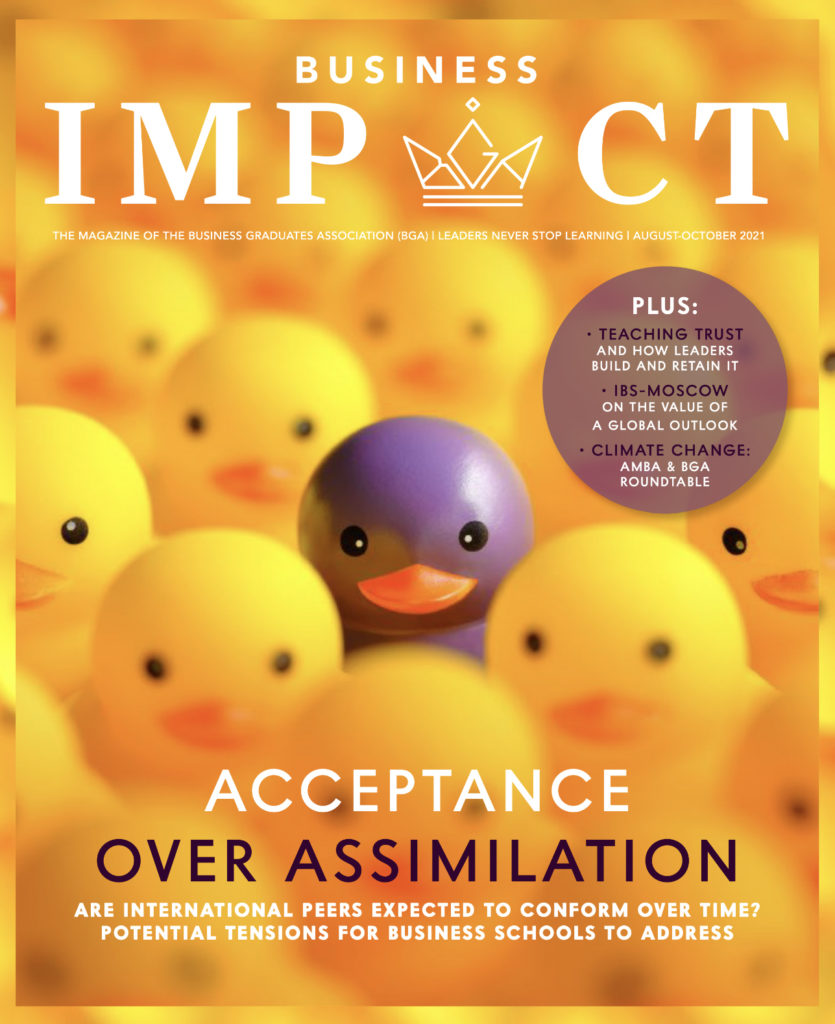How do scholarships benefit a Business School’s community as well as individual recipients? MCI’s Leena Saurwein and Susanne Lichtmannegger outline the value of initiatives aimed at allowing international students to pursue their studies and make a difference
Growing up in Warri, Delta State, Nigeria, Benedicta always showed interest in the field of women’s health, in particular dysmenorrhea [also known as period pain]. At a young age in 2016, she founded the Girls Health and Education Foundation with professionals and volunteers to provide sexual and reproductive health education to school-age girls, impacting more than 3,000 students.
Alongside this, Benedicta also engaged in creating products, such as reusable sanitary pads, to make it possible for girls to attend school during their menstruation. Currently, her foundation is partnering with Denmark-based OrganiCup on a survey of young girls and women across six states of Nigeria to assess the acceptance and usage of modern period products like the menstrual cup.
Benedicta’s dedicated engagement and commitment to the UN SDGs qualified her for the Ban Ki-moon Scholarship offered by MCI | The Entrepreneurial School® (MCI) and she is now doing her master’s in international health and social management at the institution in Innsbruck, Austria.
For Benedicta, it’s a dream come true. The scholarship is an opportunity for a deserving student like her to pursue postgraduate studies without taking on serious financial burdens. It’s also recognition and reward for her academic and meaningful accomplishments thus far.
Scholarships as triggers for change
The Ban Ki-moon Scholarship was established in 2020 by MCI together with the Ban Ki-moon Centre for Global Citizens (BKMC) located in Vienna. This scholarship is specifically designed to support students who pledge to engage in, and put into the action, the UN SDGs.
‘In 2021, we had the opportunity to award the Ban Ki-moon Scholarship at MCI to two outstanding changemakers from Nigeria and Pakistan, who were selected to attend a master’s programme starting in September 2021, dedicated to the SDGs and global citizenship,’ says BKMC CEO, Monika Froehler.
‘It is the BKMC’s strong conviction that the world needs a generation of global citizens who act with passion and compassion, who value solidarity and diversity, and who can spot challenges and find solutions to transform their communities, regions, nations and the world,’ Froehler continues.
In a similar vein, the Jean-Claude Juncker Scholarship has recently been created under the patronage of the former President of the European Commission, Jean-Claude Juncker. This scholarship allows students engaged in the ideas, principles, values and future of the European Union as well as the economic, technological and social development of the European continent to pursue their studies at MCI and continue their involvement and contribution to democratic values and human rights.
Scholarships promote motivation and inspiration
These two scholarships, which carry the patronage of two influential world leaders, have had a positive impact on various levels.
They pioneer young, talented and committed persons to live their ambitions of contributing to society. They facilitate aspirants to study in a different country and provide them with global exposure as well as enabling them to set themselves a path for personal and professional success.
Moreover, these scholarships are an important motivator for students. Scholarship holders like Benedicta serve as markers of academic motivation. When they realise that their accomplishments have been recognised, it boosts their confidence to pursue their goals. They also become more aware of their potential, fostering the growth of this potential at the same time.
For MCI, these scholarships are an opportunity to attract and support young talent from all over the world in realising their ambitions. MCI aims to create room for these inspiring scholarship holders as well as for these captivating visions to be present among its students and its academic community. The scholarship holders also serve as a role model to other students and can encourage them to get involved in working to address societal challenges.
Paving the way for international talent adds to the understanding and engagement of MCI’s student community. Students benefit from each other and are not keyed into their own realities. They, in turn, learn to value different perspectives.
Such scholarships induce a ripple effect not only on persons and on the institution as a whole, but also strongly influence the industry and the network affiliated to MCI too. In addition, industries are keen to appoint committed students and students, for their part, are likely to experience a strong connection with companies that share their visions.
MCI is strongly committed to its mission of international outreach, engagement and commitment. Helping its scholarship holders to grow personally and professionally, demonstrates the institution’s commitment to mentoring motivated individuals like Benedicta.
MCI remains firmly committed to its responsibility towards society. Its scholarships are designed to spur students on to engage themselves avidly in resolving societal issues. This, in turn, increases brand awareness with the public, as such philanthropic acts often resonate with members of society. In this manner, MCI strives to live up to societal expectations and to stay relevant to its stakeholders.
Leena Saurwein and Susanne Lichtmannegger are members of the MCI International Relations Office. MCI | The Entrepreneurial School® aims to bring the best of science, economy and consulting to the unique concept of an international Entrepreneurial School®. For more information on its scholarships, click here.
Main image credit: MCI/Kasper.
















































